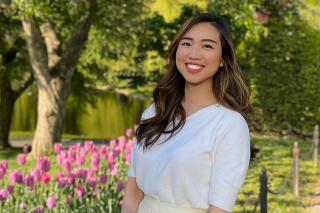Annie Chen '21 has been selected for a one-year Master of Science (MSc) in Quantitative Genetics and Genome Analysis at the University of Edinburgh in the United Kingdom. We caught up with Annie about her experience applying for the scholarship and her valuable advice for other Simmons students embarking on the Fulbright application process.
1. Start early
I recommend starting your application early, such as when the application portal opens, so you have time to secure a host affiliation and write the grant statement. I highly recommend future applicants reach out to someone they know that can connect them with a host affiliate.
You should also ask for recommendations at least two to three months before the national deadline. My application was more rushed as I had asked my recommenders a month before the deadline. It is important to recognize your recommender’s time.
2. Be specific
For the grant application, it's helpful to be specific about your extracurriculars and volunteer activities. Although I was not able to get additional affiliation letters, perhaps asking for an affiliation letter from your potential extracurricular activities would strengthen your application. The Fulbright committee wants to know if your proposed project and extracurricular activities are activities that you would carry out during your time abroad.
3. Familiarize yourself with past applications
I would also suggest taking a look at previous Fulbright statements, which can be found online, and have an idea of what a great Fulbright grant statement looks like.
4. Seek input from faculty and staff experts
Having your grant statement and personal statement read by several individuals with different areas of expertise is helpful. Dr. Nakeisha Cody and Rachel Oshinsky in the Office of Undergraduate Research & Fellowships, along with other Simmons faculty in the English, Biology, and Chemistry departments, truly provided valuable advice. I believe future Fulbright applicants will be in great hands.
5. Have a backup plan, just in case
Lastly, it may be helpful to not expect a successful result. During my application process, I knew that it was very competitive to apply for the United Kingdom. I would advise applying for other scholarships and/or jobs during the time that you are going through the Fulbright application process. It may also be helpful to know that if you are not successful the first time, you can apply again so try not to take failures personally.
The Fulbright application is long and daunting; however, regardless of the result, it is a worthwhile experience to reflect on yourself and delve deep into what exactly you want to do.

